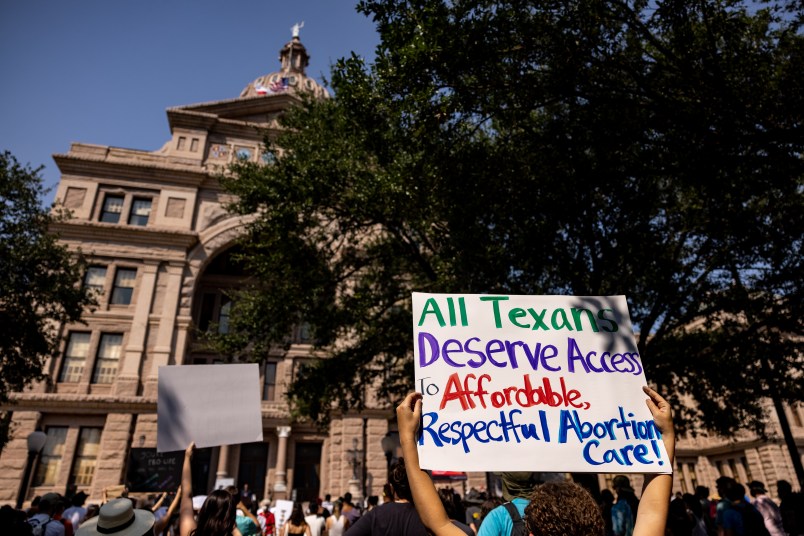Twenty-four Democratic attorneys general made clear that they support the Justice Department’s legal challenge against Texas’ anti-abortion law in an amicus brief filed Wednesday.
In their amicus brief, the group led by Massachusetts Attorney General Maura Healey argued that Texas’ new six-week abortion ban is in “direct contravention” of the Supreme Court precedent affirming the constitutional right to terminate a pregnancy prior to viability, which the court recognized in its 1973 decision in Roe v. Wade.
“Today, virtually no one can obtain an abortion in Texas,” the brief reads. “In order to obtain abortion care, patients now have to travel out-of-state, which makes abortion for many people too difficult, too time-intensive, and too costly.”
The group noted that residents of their respective states may require an abortion while in Texas, which could include workers, visitors or students from out of state.
Additionally, they expressed concerns for Texans who are now seeking abortions outside of the Lone Star state as a result of a ban, and how that could potentially add more burdens onto already strained health care systems in their states.
“In New Mexico, for example, an influx of patients from Texas has already strained provider resources and made it more difficult for New Mexico residents to receive timely care,” the brief reads. “Similar impacts are being seen or expected to be seen in other Amici States, including California, Colorado, Illinois, and Nevada.”
The amicus brief’s Wednesday filing was issued after the Justice Department filed an emergency request late Tuesday night to freeze Texas’ anti-abortion law. Instead of immediately acting on the request, U.S. District Judge Robert L. Pitman agreed to the state’s request to hear arguments before ruling, and scheduled a hearing on Oct. 1 to consider temporarily blocking Texas’ six-week abortion ban.
The DOJ’s emergency request follows its lawsuit against the state of Texas last week over its anti-abortion law that the Supreme Court declined to block.
The DOJ’s lawsuit, which was filed in Austin last week, seeks a judgment deeming the law invalid under the Supremacy Clause and the Fourteenth Amendment, and for an order blocking anyone from carrying it out.
“The United States has the authority and responsibility to ensure that Texas cannot evade its obligations under the Constitution and deprive individuals of their constitutional rights by adopting a statutory scheme designed specifically to evade traditional mechanisms of federal judicial review,” the DOJ’s lawsuit reads. “The federal government therefore brings this suit directly against the State of Texas to obtain a declaration that S.B. 8 is invalid, to enjoin its enforcement, and to protect the rights that Texas has violated.”
The DOJ’s lawsuit also took aim at the Texas law for allowing individuals from anywhere in the country to sue anyone who performs post-six week abortions, or who “aids or abets” it — which could net the plaintiff a $10,000 bounty and all legal fees paid for by the defendant.
“It takes little imagination to discern Texas’s goal—to make it too risky for an abortion clinic to operate in the State,” the DOJ’s lawsuit reads.
The DOJ’s lawsuit claims that the state is the rightful defendant.
“The United States therefore may sue a State to vindicate the rights of individuals when a state infringes on rights protected by the Constitution,” the DOJ’s lawsuit reads. “Such an effort is particularly warranted where, as here, private citizens are—by design—substantially burdened in vindicating their own rights.”
Prior to the announcement of the DOJ’s lawsuit, Attorney General Merrick Garland said that the DOJ will work with law enforcement to ensure the safety of abortion clinics while exploring “all options to challenge Texas SB8 in order to protect the constitutional rights of women and other persons, including access to an abortion,” citing the FACE Act — which prohibits the use of threats and physical obstruction to deter someone from seeking reproductive health services.







Sad that the Democrats have to do the job for the Supreme Court.
Of course, the Supremes may well go full Christianist and uphold the Texas law, as well as overruling Roe in the Mississippi case. That would be a true Pyrrhic victory, as it would almost guarantee the Democrats holding the House and the Senate.
And the groundswell for Supreme Court reformation to become a hurricane. Dare we say - “Bring it on”?
And thus we’ll need to name that hurricane? Do you have any preferences?
My letter in Monday’s Eugene Register-Guard (and note, IANAL but this letter was inspired by a Yale law professor, who wrote at http://balkin.blogspot.com/2021/09/private-enforcement-mechanisms-and-you.html)
Inspired by Texas
Are you tired of hearing that Trump won the 2020 election? Tired of hearing media promoting lies about COVID-19 vaccines? Texas and the U.S. Supreme Court show Oregon the way out of this dilemma.
Oregon legislators can pass, and Gov. Brown can sign into law, a bill that allows private citizens to sue anyone disseminating these lies and collect damages and attorney’s fees for each successful suit, allowing the one who sues to avoid paying any defendant’s attorney’s fees.
If a radio or TV station, radio host or TV reporter, newspaper or social media influencer, repeats or even reports such a lie, they could be sued as an abettor!
Liars might protest, “Violation of my constitutionally protected free speech rights!” But government officials wouldn’t be stripping their rights, just as no officials of Texas’s government are interfering with the constitutionally protected right to an abortion. Note: The Supreme Court refused to halt Texas’s constitutional workaround.
Act, Oregon legislators! Put an end to these harmful lies! Awaken the law, that confused giant! Show that Oregonians are just as smart as Texans! Many Oregonians would be eager to take the liars and their abettors to court, so give them the tools!